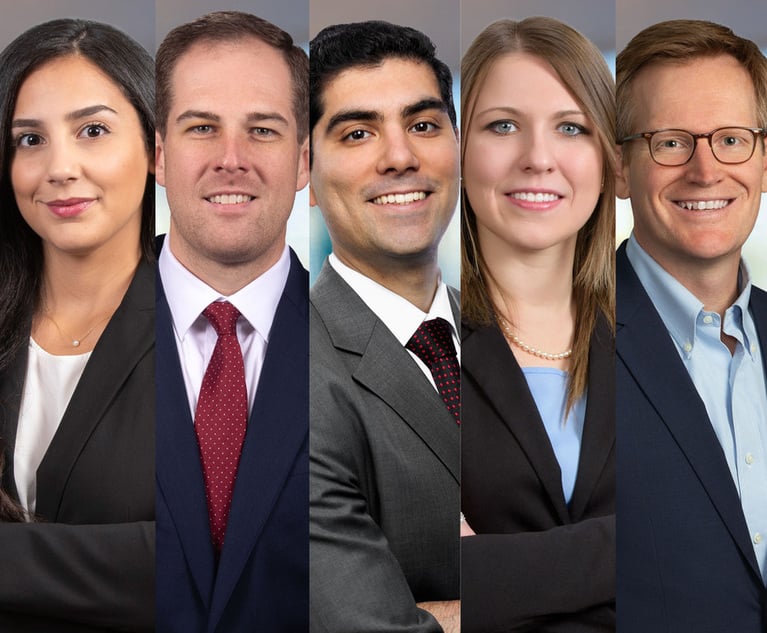Wells Fargo Report Shows Legal Market Stalled in Third Quarter
Through the first six months of this year, 2017 was shaping up to be a strong one for law firms. The same cannot be said following poor third-quarter results touted this week by two leading law firm lenders.
November 16, 2017 at 06:13 PM
4 minute read
The original version of this story was published on The American Lawyer

The legal market took a turn for the worse in the third quarter of the year, according to a report released Thursday by Wells Fargo & Co., which backed up a similar report from earlier this week by Citi Private Bank's Law Firm Group.
Year-over-year growth in revenue, demand for billable hours and revenue per lawyer all slipped in the third quarter after a relatively strong first half of the year, said the survey of 135 firms done by Wells Fargo Private Bank's Legal Specialty Group.
Revenue grew 3.7 percent year-to-date through three quarters, which was down from 4.8 percent growth through the first half of 2017, Wells Fargo said. Demand for billable hours grew slightly at 1.4 percent through nine months, compared to 1.6 percent through six months. Revenue per lawyer through nine months had grown 2.3 percent; compared to 3.2 percent through six months.
The largest firms continued to outperform their smaller peers. The Am Law 100 saw larger growth than Am Law Second Hundred firms in revenue (4.4 percent versus 1 percent); demand (2.2 percent versus minus 1.8 percent); and revenue per lawyer (2.6 percent versus 1.1 percent).
But those averages are starting to mean less and less as the dispersion of firm performance grows greater, said Jeff Grossman, a senior director of banking in Wells Fargo's Legal Specialty Group. The best performers are increasingly pulling up the averages.
Among Am Law 100 respondents, 46 percent of firms saw revenue growth through nine months of between 2 and 5 percent; 20 percent of firms saw revenue growth greater than 10 percent; and 5 percent of firms saw revenue fall more than 5 percent. The best individual performer saw revenue rise more than 25 percent without a merger, while the worst performer had revenue slip 14 percent. (Perhaps not surprisingly, law firm mergers were at a record pace through the third quarter of this year.)
Busier firms are also doing better at increasing their rates, Grossman said. For example, the standard rate for an Am Law 50 equity partner was up 5 percent through nine months. The average equity partner in the Am Law Second Hundred saw a rate increase of 3.2 percent.
“Their [utilization] is running over 80 hours behind and their rates aren't growing as fast,” Grossman said of the Am Law Second Hundred. “You can see the slippage.”
Citi's third-quarter report, released this week, said it is unlikely that 2017 will be as strong of a financial year as 2016 for the country's law firms. The Citi report showed striking similarity with Wells Fargo on revenue growth, reporting 3.6 percent growth through nine months this year.
Billing rate increases of 4 percent were the largest factor; outpacing the 3.2 percent growth from a year ago. Offsetting that was a dip in demand of 0.2 percent, which compared unfavorably to a 0.3 percent increase during the same period last year.
One reason for optimism: The Citi and Wells Fargo reports said inventory, or uncollected bills, had reached a high point. Citi said inventory grew 4.6 percent at the end of nine months, well ahead of a 3.1 percent increase through the same period last year. And accounts receivable growth was up 6.7 percent through nine months, compared to only 2.6 percent a year ago.
Law firms will be gearing up for another year-end collections push. But as the holiday season looms on the horizon, don't give into the eggnog quite yet.
This content has been archived. It is available through our partners, LexisNexis® and Bloomberg Law.
To view this content, please continue to their sites.
Not a Lexis Subscriber?
Subscribe Now
Not a Bloomberg Law Subscriber?
Subscribe Now
NOT FOR REPRINT
© 2025 ALM Global, LLC, All Rights Reserved. Request academic re-use from www.copyright.com. All other uses, submit a request to [email protected]. For more information visit Asset & Logo Licensing.
You Might Like
View All
K&L Gates Files String of Suits Against Electronics Manufacturer's Competitors, Brightness Misrepresentations
3 minute read
Eleven Attorneys General Say No to 'Unconstitutional' Hijacking of State, Local Law Enforcement
3 minute read
'Battle of the Experts': Bridgeport Jury Awards Defense Verdict to Stamford Hospital
3 minute readTrending Stories
- 1Buchalter Hires Longtime Sheppard Mullin Real Estate Partner as Practice Chair
- 2A.I. Depositions: Court Reporters Are Watching Texas Case
- 3Second DCA Greenlights USF Class Certification on COVID-19 College Tuition Refunds
- 435 Years After CT's Affordable Housing Act, Progress Remains a Struggle
- 5Bankruptcy Judge Clears Path for Recovery in High-Profile Crypto Failure
Who Got The Work
J. Brugh Lower of Gibbons has entered an appearance for industrial equipment supplier Devco Corporation in a pending trademark infringement lawsuit. The suit, accusing the defendant of selling knock-off Graco products, was filed Dec. 18 in New Jersey District Court by Rivkin Radler on behalf of Graco Inc. and Graco Minnesota. The case, assigned to U.S. District Judge Zahid N. Quraishi, is 3:24-cv-11294, Graco Inc. et al v. Devco Corporation.
Who Got The Work
Rebecca Maller-Stein and Kent A. Yalowitz of Arnold & Porter Kaye Scholer have entered their appearances for Hanaco Venture Capital and its executives, Lior Prosor and David Frankel, in a pending securities lawsuit. The action, filed on Dec. 24 in New York Southern District Court by Zell, Aron & Co. on behalf of Goldeneye Advisors, accuses the defendants of negligently and fraudulently managing the plaintiff's $1 million investment. The case, assigned to U.S. District Judge Vernon S. Broderick, is 1:24-cv-09918, Goldeneye Advisors, LLC v. Hanaco Venture Capital, Ltd. et al.
Who Got The Work
Attorneys from A&O Shearman has stepped in as defense counsel for Toronto-Dominion Bank and other defendants in a pending securities class action. The suit, filed Dec. 11 in New York Southern District Court by Bleichmar Fonti & Auld, accuses the defendants of concealing the bank's 'pervasive' deficiencies in regards to its compliance with the Bank Secrecy Act and the quality of its anti-money laundering controls. The case, assigned to U.S. District Judge Arun Subramanian, is 1:24-cv-09445, Gonzalez v. The Toronto-Dominion Bank et al.
Who Got The Work
Crown Castle International, a Pennsylvania company providing shared communications infrastructure, has turned to Luke D. Wolf of Gordon Rees Scully Mansukhani to fend off a pending breach-of-contract lawsuit. The court action, filed Nov. 25 in Michigan Eastern District Court by Hooper Hathaway PC on behalf of The Town Residences LLC, accuses Crown Castle of failing to transfer approximately $30,000 in utility payments from T-Mobile in breach of a roof-top lease and assignment agreement. The case, assigned to U.S. District Judge Susan K. Declercq, is 2:24-cv-13131, The Town Residences LLC v. T-Mobile US, Inc. et al.
Who Got The Work
Wilfred P. Coronato and Daniel M. Schwartz of McCarter & English have stepped in as defense counsel to Electrolux Home Products Inc. in a pending product liability lawsuit. The court action, filed Nov. 26 in New York Eastern District Court by Poulos Lopiccolo PC and Nagel Rice LLP on behalf of David Stern, alleges that the defendant's refrigerators’ drawers and shelving repeatedly break and fall apart within months after purchase. The case, assigned to U.S. District Judge Joan M. Azrack, is 2:24-cv-08204, Stern v. Electrolux Home Products, Inc.
Featured Firms
Law Offices of Gary Martin Hays & Associates, P.C.
(470) 294-1674
Law Offices of Mark E. Salomone
(857) 444-6468
Smith & Hassler
(713) 739-1250











